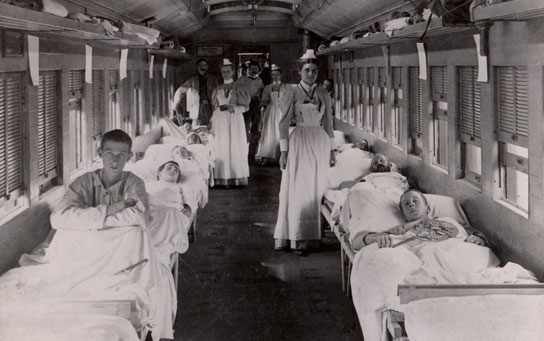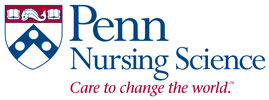Celebrating 125 Years of Nursing at Penn |
|
September 27, 2011,
Volume 58, No. 03
|
Since the beginning of the modern nursing profession, when formally preparing nurses to treat the sick was a novel concept, Penn has been at the forefront. Today, the University of Pennsylvania School of Nursing is a pioneer in research, clinical development, and education. As a leader in nursing science, Penn Nursing is one of the premier research institutions in the world, and faculty at Penn Nursing consistently receive more research funding from the National Institutes of Health than those at any other private nursing school. Penn Nursing produces new knowledge in aging, biobehavioral research, health disparities, health outcomes and policy, the history of nursing, transitions in health, and the spectrum of healthcare. Many Penn Nursing master’s programs are ranked first in the country and Penn Nursing students are prepared to be nurse leaders in the 21st century.
In September, 1886, The Training School for Nurses of the Hospital of the University of Pennsylvania opened to care for the patients of the hospital’s physicians. Students like Mary J. Burns, the first graduate of the school in 1887, were expected to keep a demanding schedule of class work, lecture attendance, and patient care six-and-a-half days a week.
In 1898, the HUP School undertook its first out-of-state outreach program. HUP nurses staffed a train bringing Spanish-American War soldiers from Chickamauga Park, TN, to Philadelphia to be treated for typhoid (see below).
 |
|

A detail of “The History of Nursing As Seen Through the Lens of Art” in the Ware Lobby of Fagin Hall. The installation was commissioned by the HUP Alumni Board and created by HUP Nursing alumna and artist Kathy Shaver, HUP’76, to commemorate 125 years of nursing education at Penn. There are over two dozen images; this is one is entitled, “Engagement.”
|
In the early 20th century, nursing students continued to apply themselves to a rigorous schedule of study, patient care, and physician assistance. All their education was accomplished in the hospital setting.
In 1935, Penn’s School of Education added a department of nursing education. In 1944, the University established a formal degree-granting program in the Division of Medical Affairs at the Medical School. The programs merged in 1950 to create an independent School of Nursing of the University of Pennsylvania. Theresa I. Lynch, EdD, RN, a 1920 graduate of the HUP School of Nursing, was the first and founding dean of the new School of Nursing.
By 1961, the Graduate Division of the School of Nursing was established and students were admitted to programs leading to the master of science in nursing. Upon Dean Lynch’s retirement, Dorothy Mereness,
EdD, RN, FAAN, a significant figure in psychiatric-mental health nursing, was appointed dean. Her tenure was marked by a growth in graduate education and development of specialty preparation at the master’s level.
As dean, Dr. Claire M. Fagin set the school on a course of research and clinical development and developed landmark education programs. Dr. Fagin served as the interim president of the University of Pennsylvania from July 1, 1993, to June 30, 1994.
As dean, Dr. Norma M. Lang instituted a three-part mission to enhance and integrate nursing research, education, and practice. Dr. Lang’s vision of interdisciplinary nurse-managed clinical practices is a lasting contribution to schools of nursing internationally.
As interim dean, Dr. Neville E. Strumpf reinvigorated faculty governance, moved strategic planning initiatives forward, and continued to build the School’s reputation for scholarship.
Dr. Afaf I. Meleis became the fifth dean of the School in 2002. Under her leadership, Penn Nursing has positioned itself as one of the world’s pre-eminent schools of nursing, internationally renowned for innovative research, teaching, and practice.
Leading an intensive strategic planning initiative, Dr. Meleis has overseen a broad program of research development, the integration of nursing practice and nursing education, and a focus on nursing’s influence in health policy. Under her leadership, the School established the departments of Biobehavioral Health Sciences and Family and Community Health; a new Office for Practice and Community Affairs; and new research centers, including the Biobehavioral Research Center, the Center for Health Equity Research, the NewCourtland Center for Transitions and Health, and in 2011, the Center for Global Women’s Health.
Today, the School’s emphasis on “Nursing Science” and “Care to Change the World” reflect the School’s reach and Penn Nursing’s presence in the many education abroad programs, interprofessional global partnerships,
international research projects, and the many evidence-based models of care implemented in different countries. Internationally renowned for her work in nursing theory and her devotion to the health of women and girls, Dr. Meleis has intensified efforts to improve their health around the world, creating international academic partnerships, developing relationships with the United Nations and other international organizations dedicated to equity and well-being. “Where Science Leads: The Campaign for Penn Nursing,” a $75 million initiative, strengthened the School’s endowment and increased student scholarships and faculty support.
Innovations in Nursing at Penn
• The first nursing doctorate in the Ivy League
• The first Ivy League institution to offer three levels of nursing education: bachelor’s, master’s, and doctorate.
• The first privately funded center for nursing research in the country
• The first school at Penn and one of the first in North America to be named a World Health Organization Collaborating Center
• Continuous national leader in funded research
• Naming some of the first endowed chairs for nursing in the country
• HUP faculty member Jane A. Delano founded the Red Cross Nursing Service
• First nurse recipient of the MacArthur Genius Award, HUP alumna Ruth Lubic
• Seminal nursing text Medical-Surgical Nursing, by HUP leader Lillian Sholtis Brunner
• Breaking such barriers as getting grants from the National Institutes of Health and publication in the New England Journal of Medicine
• Establishing advanced practice nurses as independent healthcare providers in primary care, nurse-midwifery, gerontology, and other specialties formerly exclusive to physicians
• Establishing pioneering research centers
|
|
|
Nurses educated at HUP and Penn have long served in wartime, as home defense nurses and overseas on troop trains, transport ships, and on battlefields. |
|
Penn Nursing established a forward-looking and innovative network of nurse-managed practices, including the highly successful LIFE (Living Independently For Elders), which offers home care and support to frail elders. |

The School’s history and future
rest upon the accomplishments
of 125 years of extraordinary
women and men in nursing.
See www.nursing.upenn.edu/125th
for a timeline and
more photos from the past.
|
|

The School of Nursing building has been renovated and renamed in honor of Dr. Claire M. Fagin. The undergraduate curriculum has been revised for 2011, integrating theory, practice, and technology to prepare Penn Nursing graduates for leadership in the 21st century. |
 |
Dean Afaf I. Meleis and the faculty of the School of Nursing extend an invitation to commemorate the 125th anniversary of nursing education at Penn: On November 4, 2:30-3:30 p.m., join artist Kathy Shaver, HUP’76, who created a new art installation at Penn Nursing, for a conversation about the history of art in nursing in the Ware Lobby of Fagin Hall.
On November 9, 2:30-3:30 p.m., Dr. Richard Horton, editor-in-chief of The Lancet will lecture on Health & Social Justice: Enemies or Bedfellows? lecture and reception in Fagin Hall. |
|